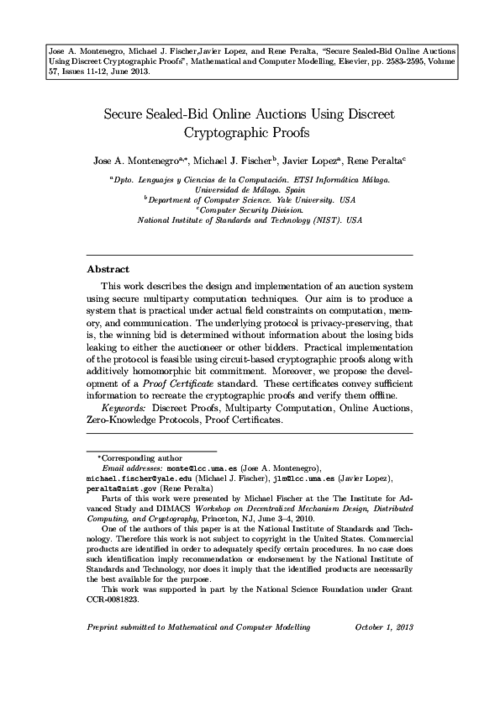 ] Year
] Year 8th International Workshop on Security and Trust Management (STM 2012), A. Jøsang, P. Samarati, and M. Petrocchi Eds., LNCS 7783, Springer, pp. 113-128, 2013. DOI
Abstract
During the last years, many trust and reputation models have been proposed, each one targeting different contexts and purposes, and with their own particularities. While most contributions focus on defining ever-increasing complex models, little attention has been paid to the process of building these models inside applications during their implementation. The result is that models have traditionally considered as ad-hoc and after-the-fact solutions that do not always fit with the design of the application. To overcome this, we propose an object-oriented development framework onto which it is possible to build applications that require functionalities provided by trust and reputation models. The framework is extensible and flexible enough to allow implementing an important variety of trust models. This paper presents the framework, describes its main components, and gives examples on how to use it in order to implement three different trust models.
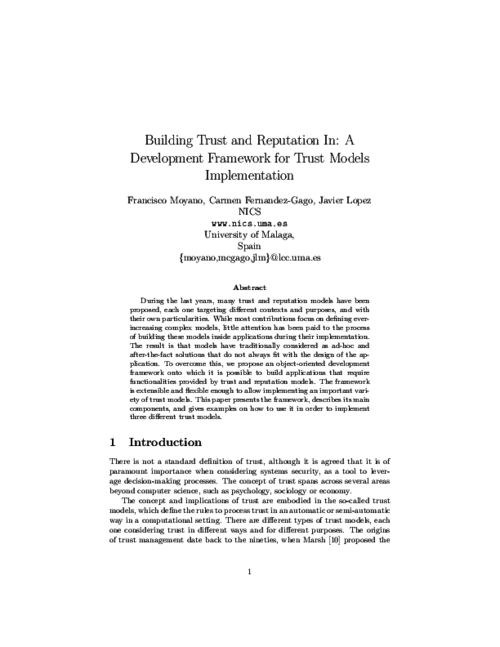
8th International Conference on Availability, Reliability and Security, IEEE, pp. 121-130, Nov 2013. DOI
Abstract
The number of insider threats hitting organizations and big enterprises is rapidly growing. Insider threats occur when trusted employees misuse their permissions on organizational assets. Since insider threats know the organization and its processes, very often they end up undetected. Therefore, there is a pressing need for organizations to adopt preventive mechanisms to defend against insider threats. In this paper, we propose a framework for insiders identification during the early requirement analysis of organizational settings and of its IT systems. The framework supports security engineers in the detection of insider threats and in the prioritization of them based on the risk they represent to the organization. To enable the automatic detection of insider threats, we extend the SI* requirement modeling language with an asset model and a trust model. The asset model allows associating security properties and sensitivity levels to assets. The trust model allows specifying the trust level that a user places in another user with respect to a given permission on an asset. The insider threats identification leverages the trust levels associated with the permissions assigned to users, as well as the sensitivity of the assets to which access is granted. We illustrate the approach based on a patient monitoring scenario.
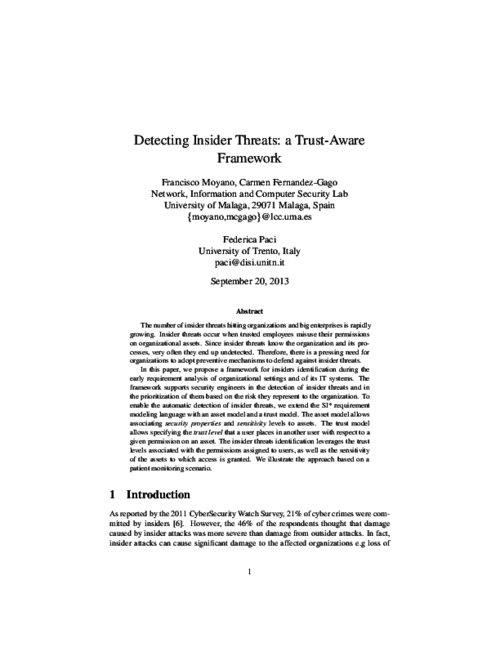
7th IFIP WG 11.11 International Conference on Trust Management (IFIPTM 2013), C. Fernandez-Gago, I. Agudo, F. Martinelli, and S. Pearson Eds., AICT 401, Springer, pp. 255-262, Jun 2013. DOI
Abstract
The Future Internet (FI) comprises scenarios where many heterogeneous and dynamic entities must interact to provide services (e.g., sensors, mobile devices and information systems in smart city scenarios). The dynamic conditions under which FI applications must execute call for self-adaptive software to cope with unforeseeable changes in the application environment. Software engineering currently provides frameworks to develop reasoning engines that automatically take reconfiguration decisions and that support the runtime adaptation of distributed, heterogeneous applications. However, these frameworks have very limited support to address security concerns of these application, hindering their usage for FI scenarios. We address this challenge by enhancing self-adaptive systems with the concepts of trust and reputation. Trust will improve decision-making processes under risk and uncertainty, in turn improving security of self-adaptive FI applications. This paper presents an approach that includes a trust and reputation framework into a platform for adaptive, distributed component-based systems, thus providing software components with new abilities to include trust in their reasoning process.
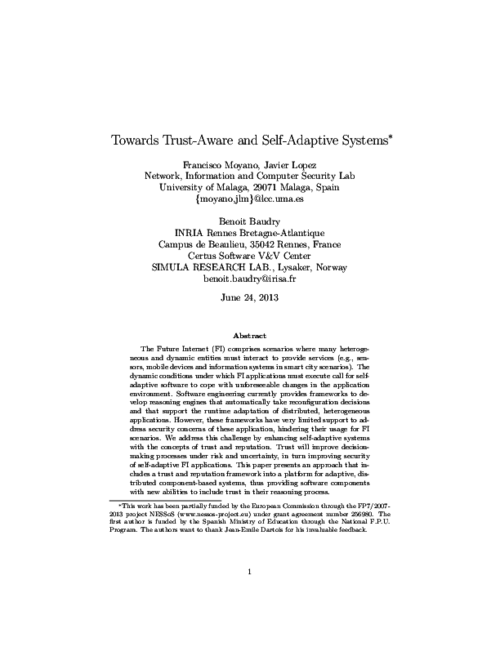
Trust Management VII, 7th WG11.11 International conference
, vol. 401, Springer, June 2013.
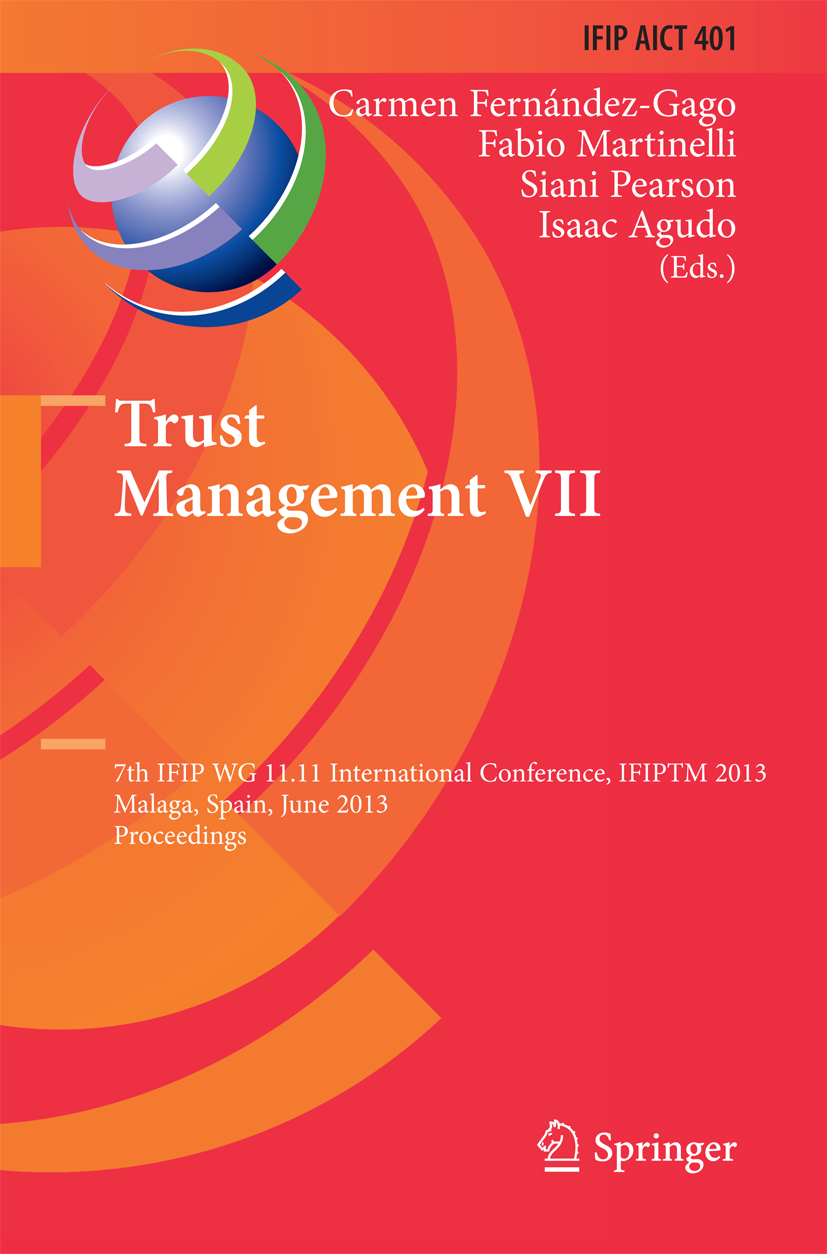 |  |
Mathematical and Computer Modelling, vol. 57, Elsevier, pp. 2583–2595, Jun 2013. DOI
Abstract
This work describes the design and implementation of an auction system using secure multiparty computation techniques. Our aim is to produce a system that is practical under actual field constraints on computation, memory, and communication. The underlying protocol is privacy-preserving, that is, the winning bid is determined without information about the losing bids leaking to either the auctioneer or other bidders. Practical implementation of the protocol is feasible using circuit-based cryptographic proofs along with additively homomorphic bit commitment. Moreover, we propose the development of a Proof Certificatestandard. These certificates convey sufficient information to recreate the cryptographic proofs and verify them offline.
